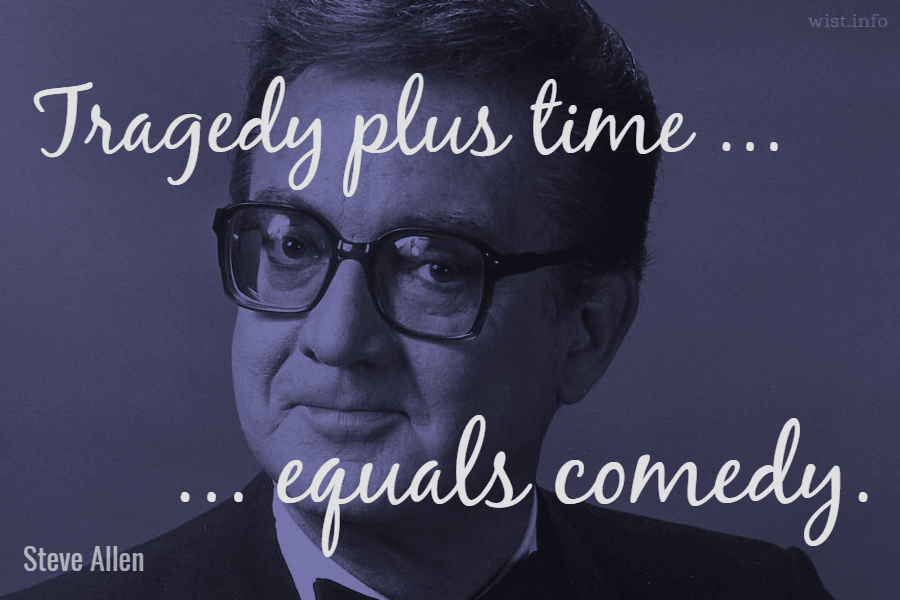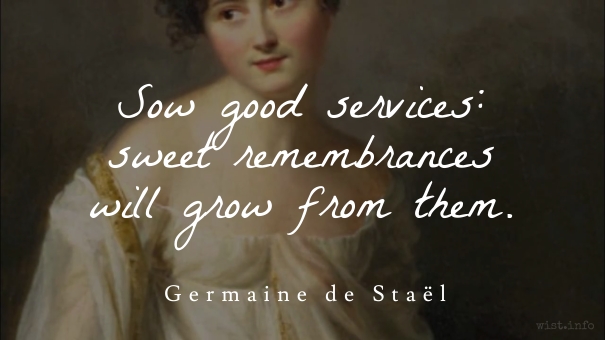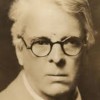Those were great old days, (but darn it any old days are great old days. Even the tough ones, after they are over, you can look back with great memories.)
Quotations about:
recollection
Note not all quotations have been tagged, so Search may find additional quotes on this topic.
I conceive that there is nothing which gives a man more pause before taking as absolute what his feelings welcome, and his mind deems plausible, than even the flicker of recollection that something of the sort has been tried before, felt before, disputed before, and for some reason or other has now quite gone into Limbo.
Learned Hand (1872-1961) American jurist
“Sources of Tolerance,” speech, University of Pennsylvania Law School (1930-06)
(Source)
Try as we will, we cannot honestly recall our youth, for we have lost the feel of its main ingredient: suspense.
Mignon McLaughlin (1913-1983) American journalist and author
The Neurotic’s Notebook, ch. 3 (1963)
(Source)
Life brings no greater grief
Than happiness remembered in a time
Of sorrow.[Nessun maggior dolore
Che ricordarsi del tempo felice
Ne la miseria.]Dante Alighieri (1265-1321) Italian poet
The Divine Comedy [Divina Commedia], Book 1 “Inferno,” Canto 5, l. 121ff (5.121-123) [Francesca] (1309) [tr. James (2013), l. 141ff]
(Source)
Francesca de Rimini is responding to Dante's request to speak of her love affair while in the middle of being punished for it. It is a true (if slanted) tale that occurred when Dante was a young man. Francesca da Polenta wed the crippled Giovanni Malatesta de Rimini, but fell in adulterous love with his brother, Paolo. Upon discovery of their affair, Giovanni killed them both. This was a local scandal, and would have been lost to time if Dante had not recorded it here. He relegates the lovers to the "least" eternal punishment in Hell, in the circle of carnal sins -- while Giovanni (who was still alive when this was written) is doomed to a lower circle for the murder (treachery to kindred). (More info.)
Inspiration for this particular phrase has been credited to many sources: Wisdom 11:11-12, Boethius (Consolation of Philosophy, 2.4.3-6), and Pindar (Pythian 4.510-512) are the most common. Augustine (Confessions 10.14) and Thomas Aquinas have also been cited.
(Source (Italian)). Alternate translations:No greater grief assails us [...]
Than in unhappy hours to recollect
A better time.
[tr. Rogers (1782)]Oh! how grievous to relate
Past joys, and tread again the paths of fate.
[tr. Boyd (1802), st. 23]No greater grief than to remember days
Of joy, when mis'ry is at hand!
[tr. Cary (1814)]No keener pang hath hell.
Than to recall, amid some deep distress,
Our happier time.
[tr. Dayman (1843)]There is no greater pain than to recall a happy time in wretchedness.
[tr. Carlyle (1849)]There is no greater grief
Than to remember happiness in woe.
[tr. Bannerman (1850)]No greater grief than this,
Mem'ry to hold of the past happy time
In misery.
[tr. Johnston (1867)]There is no greater sorrow
Than to be mindful of the happy time
In misery.
[tr. Longfellow (1867)]No greater woe is there than to call to mind the happy time in your misery.
[tr. Butler (1885)]There is no greater grief
Than to remember us of happy time
In misery.
[tr. Minchin (1885)]There is no greater woe than in misery to remember the happy time.
[tr. Norton (1892)]No deeper sorrow is, than to recall a time of happiness, in misery's hour.
[tr. Sullivan (1893)]There is no greater sorrow
Than to recall to memory times of gladness
In misery.
[tr. Griffith (1908)]There is no greater pain than to recall the happy time in misery.
[tr. Sinclair (1939)]No grief surpasses this [...]
In the midst of misery to remember bliss.
[tr. Binyon (1943)]The bitterest woe of woes
Is to remember in our wretchedness
Old happy times.
[tr. Sayers (1949)]The double grief of a lost bliss
is to recall its happy hour in pain.
[tr. Ciardi (1954), ll. 118-19]There is no greater sorrow than to recall, in wretchedness, the happy time.
[tr. Singleton (1970)]There is no greater pain
than to remember, in our present grief,
past happiness!
[tr. Musa (1971)]There is no greater sorrow
than thinking back upon a happy time
in misery.
[tr. Mandelbaum (1980)]There is no greater sorrow
Than to think backwards to a happy time,
When one is miserable.
[tr. Sisson (1981)]No sadness
Is greater than in misery to rehearse
Memories of joy.
[tr. Pinsky (1994), l. 107ff]There is no greater pain than to remember the happy time in wretchedness.
[tr. Durling (1996)]There is no greater pain, than to remember happy times in misery.
[tr. Kline (2002)]There is no greater pain, I fear,
than to recall past joy in present hell.
[tr. Carson (2002)]There is no sorrow greater
than, in times of misery, to hold at heart
the memory of happiness.
[tr. Kirkpatrick (2006)]There is no greater sorrow
than to recall our time of joy
in wretchedness.
[tr. Hollander/Hollander (2007)]No sadness afflicts the heart
More than recalling, in times of utter disaster,
Sweetened days in which we knew no darkness.
[tr. Raffel (2010)]What's sadder than remembering
The happy past when you're feeling wretched?
[tr. Bang (2012)]
Our memories are card-indexes consulted and then put back in disorder by authorities whom we do not control.
Cyril Connolly (1903-1974) English intellectual, literary critic and writer.
The Unquiet Grave, Part 3 “La Clé des Chants” (1944)
(Source)
Lift up your hearts!
No more complaint and fear! It well may be
some happier hour will find this memory fair.[Revocate animos, maestumque timorem
mittite: forsan et haec olim meminisse iuvabit.]Virgil (70-19 BC) Roman poet [b. Publius Vergilius Maro; also Vergil]
The Aeneid [Ænē̆is], Book 1, l. 202ff (1.202-203) (29-19 BC) [tr. Williams (1910)]
(Source)
(Source (Latin)). Alternate translations:Courage recall, banish sad feare; delight
It may hereafter these things to recite,
[tr. Ogilby (1649)]Resume your courage and dismiss your care.
An hour will come, with pleasure to relate
Your sorrows past, as benefits of Fate.
[tr. Dryden (1697)]Resume then your courage, and dismiss your desponding fears; perhaps hereafter it may delight you to remember these sufferings.
[tr. Davidson/Buckley (1854)]Come, cheer your souls, your fears forget;
This suffering will yield us yet
A pleasant tale to tell.
[tr. Conington (1866)]Recall your courage ; banish gloomy fears.
Some day perhaps the memory even of these
Shall yield delight.
[tr. Cranch (1872)]Recall your courage, put dull fear away. This too sometime we shall haply remember with delight.
[tr. Mackail (1885)]Come, call aback your ancient hearts and put your fears away!
This too shall be for joy to you remembered on a day.
[tr. Morris (1900)]Fear not; take heart; hereafter, it may be
These too will yield a pleasant tale to tell.
[tr. Taylor (1907)]Recall your courage and put away sad fear. Perchance even this distress it will some day be a joy to recall.
[tr. Fairclough (1916)]Call the nerve back; dismiss the fear, the sadness.
Some day, perhaps, remembering even this
Will be a pleasure.
[tr. Humphries (1951)]Take heart again, oh, put your dismal fears away!
One day -- who knows? -- even these will be grand things to look back on.
[tr. Day Lewis (1952)]Call back
your courage, send away your grieving fear.
Perhaps one day you will remember even
these our adversities with pleasure.
[tr. Mandelbaum (1971), l. 281ff]Now call back
Your courage, and have done with fear and sorrow.
Some day, perhaps, remembering even this
Will be a pleasure.
[tr. Fitzgerald (1981), l. 275ff]So summon up your courage once again. This is no time for gloom or fear. The day will come, perhaps, when it will give you pleasure to remember even this.
[tr. West (1990)]Remember your courage and chase away gloomy fears:
perhaps one day you’ll even delight in remembering this.
[tr. Kline (2002)]Recall your courage
And put aside your fear and grief. Someday, perhaps,
It will help to remember these troubles as well.
[tr. Lombardo (2005), l. 238ff]Call up your courage again. Dismiss your grief and fear.
A joy it will be one day, perhaps, to remember even this.
[tr. Fagles (2006)]Perhaps one day it will be a joy to remember also these things.
[tr. @sentantiq (2011)]Summon your spirits back, and abandon your sad fear:
perhaps one day even these things will be a pleasing memory.
[tr. @sentantiq/Robinson (2015)]Perhaps one day it will be a joy to remember even these things
[tr. @sentantiq (2016)]One day we’re going to look back on even this and laugh (maybe).
[tr. Tortorelli (2017)]Perhaps someday it will bring pleasure to recall these things.
[tr. @sentantiq (2020)]Be brave, let go your fear and despair.
Perhaps someday even memory of this will bring you pleasure.
[tr. Bartsch (2021)]
Commentary on this passage: A Hope for Better Days to Come – SENTENTIAE ANTIQUAE.
There are two cinemas: the films we have actually seen and the memories we have of them. The gap between the two widens over the years.
Molly Haskell (b. 1939) American feminist film critic and author.
From Reverence to Rape: The Treatment of Women in the Movies (3rd ed, 2016; orig 1973)
(Source)
A good man can expand his life: he lives
twice over whose past life can be enjoyed.[Ampliat ætatis spatium sibi vir bonus. Hoc est
Vivere bis, vita posse priore frui.]Martial (AD c.39-c.103) Spanish Roman poet, satirist, epigrammatist [Marcus Valerius Martialis]
Epigrams [Epigrammata], Book 10, epigram 23 (10.23.8-9) (AD 95, 98 ed.) [tr. McLean (2014)]
"To Antonius Primus." (Source (Latin)). Alternate translations:Thus good men to themselves long life can give,
T' enjoy our former life is twice to live.
[tr. May (1629)]Each must, in vertue, strive for to excell;
That man lives twice, that lives the first life well.
[tr. Herrick (1648)]He liveth twice, who can the Gift retain
Of Mem'ry, to enjoy past Life again.
[tr. Cotton (1685)]Thus a good man prolongs his mortal date;
Lives twice, enjoying thus his former slate.
[tr. Hay (1755)]For he lives twice who can at once employ
The present well, and e'en the past enjoy.
[tr. Pope (1713)]They stretch the limits of this narrow span;
And, by enjoying, live past life again.
[tr. Lewis (1750)]A good man amplifies the span of his existence ; for this is to live twice, to be able to find enjoyment in past life.
[tr. Amos (1858); he gives several other contemporary uses and translations.]A good man lengthens his term of existence; to be able to enjoy our past life is to live twice.
[tr. Bohn's Classical (1859)]So good men lengthen life; and to recall
The past, is to have twice enjoyed it all.
[tr. Stevenson (c. 1883)]The good man prolongs his life; to be able to enjoy one's past life is to live twice.
[Bartlett's (1891)]A good man has a double span of life,
For to enjoy past life is twice to live.
[ed. Harbottle (1897)]A good man widens for himself his age's span; he lives twice who can find delight in life bygone.
[tr. Ker (1919)]Redoubled happiness and life hath he
Whose joy doth live again in memory.
[tr. Pott & Wright (1921)]The good man lengthens out his earthly skein,
For living in the past is life again.
[tr. Francis & Tatum (1924), #525]A good man's life is doubly long,
For he lives twice who, day and night,
Can in his whole past take delight.
[tr. Marcellino (1968)]Virtue extends our days: he lives two lives who relives his past with pleasure.
[Bartlett's (1968)]A good man enlarges for himself his span of life. To be able to enjoy former life is to live twice over.
[tr. Shackleton Bailey (1993)]The good man has no ugly past he would forget,
So memory gives him doubled life without regret.
[tr. Ericsson (1995)]He does not deplore life's brevity.
For virtue is itself longevity.
[tr. Wills (2007)]When I remember,
success, failure,
friend, enemy,
wife, lover
I live twice over.
[tr. Kennelly (2008), "Living"]A good man can expand his life: he lives
twice over whose past life can be enjoyed.
[tr. McLean (2014)]The good man broadens for himself the span of his years: to be able to enjoy the life you have spent, is to live it twice.
[tr. Nisbet (2015)]
Tragedy plus time equals comedy.
Steve Allen (1922-2000) American composer, entertainer, and wit.
“Steve Allen’s Almanac,” Cosmopolitan (Feb 1957)
Similar formulations have been made by Carol Burnett, Lenny Bruce, Bob Newhart, and Woody Allen. For more discussion see here.
Sow good services: sweet remembrances will grow from them.
Things said or done long years ago,
Or things I did not do or say
But thought that I might say or do,
Weigh me down, and not a day
But something is recalled,
My conscience or my vanity appalled.William Butler Yeats (1865-1939) Irish poet and dramatist
“Vacillation,” st. 4 (1932), The Winding Stair and Other Poems (1933)
(Source)
Memory is often the attribute of stupidity; it generally belongs to heavy spirits whom it makes even heavier by the baggage it loads them down with.
I shudder as I tell the tale.
[Horresco réferens]
Virgil (70-19 BC) Roman poet [b. Publius Vergilius Maro; also Vergil]
The Aeneid [Ænē̆is], Book 2, l. 204 (2.204) [Aeneas] (29-19 BC) [tr. Fairclough (1916)]
(Source)
Telling Dido of the terrible deaths of the Trojan priest Laocoön and his sons.
(Source (Latin)). Alternate translations:I shake to mention.
[tr. Ogilby (1649)]I shudder at the relation.
[tr. Davidson/Buckley (1854)]I quail,
E'en now, at telling of the tale
[tr. Conington (1866)]I shudder as I tell.
[tr. Cranch (1872)]I shudder as I recall.
[tr. Mackail (1885)]I tremble in the tale.
[tr. Morris (1900)]The tale I shudder to pursue
[tr. Taylor
(1907)]I shudder as I tell.
[tr. Williams (1910)]I shudder even now,
Recalling it.
[tr. Humphries (1951)]Telling it makes me shudder.
[tr. Day-Lewis (1952)]I shudder
to tell what happened.
[tr. Mandelbaum (1971)]I shiver to recall it.
[tr. Fitzgerald (1981)]I shudder at the memory of it.
[tr. West (1990)]I shudder to tell it.
[tr. Kline (2002)]I shudder to recall them.
[tr. Lombardo (2005)]I cringe to recall it now.
[tr. Fagles (2006)]I shudder at the telling.
[tr. Bartsch (2021)]
A safe but sometimes chilly way of recalling the past is to force open a crammed drawer. If you are searching for anything in particular you don’t find it, but something falls out at the back that is often more interesting.
J. M. Barrie (1860-1937) Scottish novelist and dramatist [James Matthew Barrie]
Peter Pan, “To the Five: A Dedication” (1928)
(Source)




















